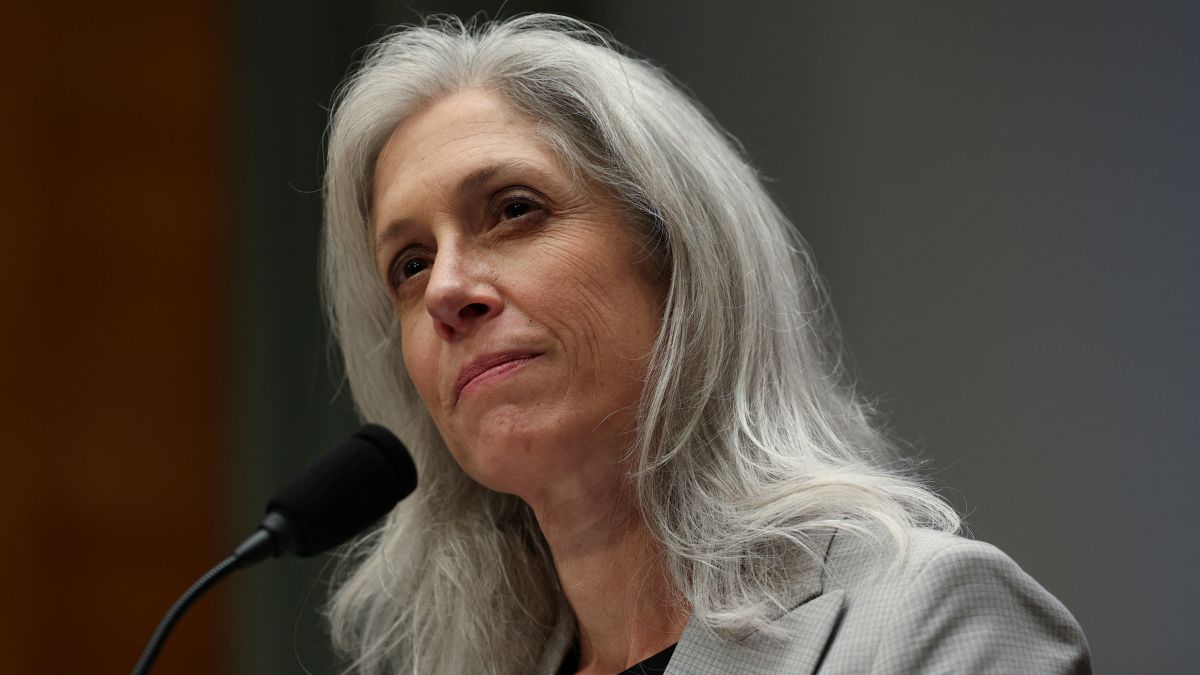The leadership of the US Centers for Disease Control and Prevention (CDC) has been thrown into turmoil following the abrupt removal of its director, Susan Monarez, less than a month after her swearing-in.
The White House announced her termination on Wednesday, but Monarez’s legal team has forcefully denied that she resigned or was fired.
Monarez’s short-lived tenure has been coupled with the resignations of several other top officials and sweeping changes to federal health guidance under US Health and Human Services (HHS) Secretary Robert F Kennedy Jr.
Was Susan Monarez removed?
White House spokesperson Kush Desai stated that Monarez had been “not aligned with the President’s agenda of Making America Healthy Again.”
He explained that after she “refused to resign despite informing HHS leadership of her intent to do so, the White House has terminated Monarez from her position with the CDC.”
The US Department of Health and Human Services also acknowledged her departure in a post on its official X account, saying, “Susan Monarez is no longer director of the Centers for Disease Control and Prevention. We thank her for her dedicated service to the American people.”
Yet this version of events was immediately challenged.
Attorneys Mark S Zaid and Abbe David Lowell, representing Monarez, rejected the White House’s account. They insisted, “As a person of integrity and devoted to science, she will not resign.”
Editor’s Picks
Their statement accused Kennedy of retaliating against her refusal to support “unscientific directives” and for resisting efforts to dismiss qualified experts from the agency.
Was RFK Jr’s radical vaccine policy behind Monarez’s ouster?
At the heart of the dispute are radical changes to vaccine policy pushed by Kennedy since he assumed his cabinet role earlier this year.
Known for his history of vaccine scepticism, Kennedy has sought to reorient the federal government’s health agencies away from prior consensus.
Among his most consequential moves was the withdrawal of official recommendations for Covid-19 vaccinations in healthy children and pregnant women, a reversal that alarmed much of the medical community.
In June, Kennedy also dismissed every member of the CDC’s expert advisory committee on vaccines, replacing them with his own appointees, several of whom are outspoken critics of vaccines.
These shifts set up a direct confrontation with Monarez, who during her Senate confirmation hearings pointed out that she had not seen scientific evidence linking vaccines to autism, a position at odds with Kennedy’s repeated claims suggesting such a connection.
Her refusal to endorse the administration’s narrowed vaccine guidance became a central reason for the push to remove her.
Two individuals familiar with internal discussions said that Kennedy, along with senior aides, had pressured Monarez to support rolling back Covid-19 vaccine approvals, reported the Washington Post.
When she declined to do so without consulting her advisers, she was urged to resign.
An administration official said that she was also pressed to dismiss her senior leadership team, a demand she did not act on.
When she resisted, Kennedy and his allies escalated their calls for her departure. Monarez reportedly reached out to US Senator Bill Cassidy, the Republican chair of the Senate health committee, who had played a pivotal role in Kennedy’s own confirmation hearings.
Cassidy had secured assurances that vaccines would remain protected during negotiations. His involvement angered Kennedy further, adding to the tensions.
Who else has resigned in Monarez’s wake?
The shakeup at the CDC extended beyond Monarez herself. Several of the agency’s most senior officials resigned within hours of the White House announcement.
Debra Houry, the CDC’s Chief Medical Officer, submitted her resignation citing the erosion of trust in science and the spread of falsehoods undermining public health. “Vaccines save lives — this is an indisputable, well-established, scientific fact,” she wrote.
“Recently, the overstating of risks and the rise of misinformation have cost lives, as demonstrated by the highest number of US measles cases in 30 years and the violent attack on our agency.”
Demetre Daskalakis, who led the National Center for Immunisation and Respiratory Diseases, also stepped down. His resignation letter stated, “I am not able to serve in this role any longer because of the ongoing weaponizing of public health.”
Daniel Jernigan, director of the National Center for Emerging and Zoonotic Infectious Diseases, announced his resignation just days after the agency confirmed the first US human case of screwworm, connected to an outbreak in Central America.
Jen Layden, who directed the CDC’s Office of Public Health Data, Surveillance and Technology, also left her post.
These resignations came on the heels of earlier departures, including that of Fiona Havers, who left in June over vaccine policy disputes.
She later called the latest developments “devastating for the CDC,” adding that the leaders who left had served as a “buffer between career CDC scientists and RFK Jr and this administration’s attacks on public health.”
What does this mean for the CDC?
The CDC was already under pressure even before Monarez’s removal. In early August, a gunman attacked its Atlanta headquarters, firing hundreds of rounds and leaving a police officer dead.
Law enforcement said the attacker was motivated by grievances related to coronavirus vaccines, which he blamed for his health problems.
The union representing CDC employees said the shooting “compounds months of mistreatment, neglect, and vilification that CDC staff have endured.”
Workers have also faced layoffs and budget constraints. Kennedy announced a restructuring plan earlier this year that led to 2,400 staff being dismissed, although around 700 were rehired.
Meanwhile, the Trump administration has sought to reduce the CDC’s budget by nearly $3.6 billion, leaving it with roughly $4 billion in funding for fiscal year 2026.
Critics within the agency argue that these cuts, combined with policy changes, undermine the CDC’s ability to respond effectively to health threats.
What is RFK Jr’s broader agenda?
Kennedy has framed his overhaul as a move to reclaim health policy from what he argues is excessive influence by pharmaceutical companies.
He has repeatedly criticised vaccines as unsafe, despite the scientific consensus to the contrary, and has referred to coronavirus vaccines as the “deadliest vaccine ever made.”
As US HHS Secretary, Kennedy has restricted the use of Covid-19 vaccines to those aged 65 and older or people with health conditions that put them at higher risk, rather than making them widely available to all individuals six months and above.
He has also halted federal research funding for mRNA vaccines, revived a task force to reexamine childhood immunisation schedules, and promised upcoming announcements in September regarding changes to autism research.
During an event with Texas Governor Greg Abbott, Kennedy said, “We have announcements that are coming out in September on autism of changes that we are going to make that will dramatically impact the effects.”
While Kennedy insists he is not “anti-vaccine,” medical experts warn that his policies risk reversing decades of progress in public health. Critics say the changes could lead to a resurgence of diseases that had been largely under control.
How was Monarez selected as CDC director?
Born November 6, 1974, Susan P Coller Monarez built a career rooted in scientific research and public service.
She earned her PhD at the University of Wisconsin-Madison in 2003, where she focused on technologies to diagnose, prevent, and treat infectious diseases, particularly those prevalent in low- and middle-income countries.
Her dissertation examined the regulation of macrophages in Trypanosoma brucei rhodesiense infections.
She continued her research at Stanford University’s School of Medicine as a postdoctoral fellow before moving into federal service.
Monarez eventually rose to senior leadership at the CDC, serving as Principal Deputy Director and Acting Director starting in January this year.
Her responsibilities included coordinating responses to public health emergencies and overseeing programs related to emerging diseases.
Earlier in her career, she was also deputy director of the Advanced Research Projects Agency for Health (ARPA-H).
When US President Donald Trump nominated her to lead the CDC permanently in March, it marked the second attempt to fill the role.
His first nominee, former congressman Dave Weldon, withdrew amid criticism of his vaccine positions. Monarez stepped down as acting director during the nomination process, in line with federal rules on temporary appointments.
On July 29, she was confirmed by the Senate in a narrow 51-47 vote split along party lines. She officially took office on July 31, becoming the first director without a medical degree since 1953.
During her Senate confirmation process, Monarez sought to distinguish herself as a proponent of evidence-based science.
The departure of Monarez and the resignations of senior officials come as the CDC navigates what may be its most fragile moment in decades.
Public health professionals warn that the erosion of expertise could leave the country unprepared for the next major outbreak.
The CDC, once viewed as a gold standard in global health, is now grappling with an internal crisis just as the world faces ongoing infectious disease threats.
Also Watch:
With inputs from agencies
End of Article

)

)